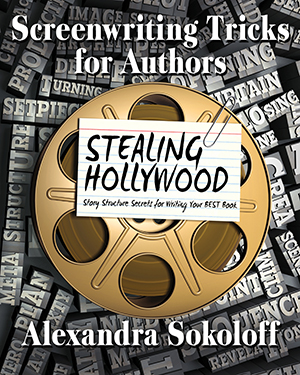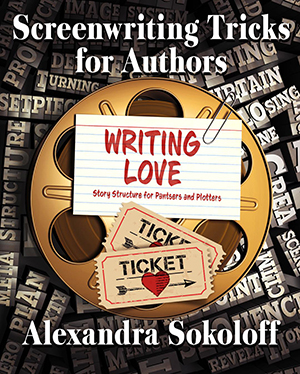I hope you’ve been feeling your creative brain focusing on the story you want to tell, and that scenes and characters and dialogue have started to bubble up all through your day (and in your dreams).
The thing is, a lot of what we call writing gets done in that quiet back of our minds, all day long, while we’re doing the most ordinary things.
Your creative brain wants to write this story—and will happily run with it for you so you don’t have to do all the work!
Today we’re going to give it something to really go to town with.
I always start my workshops off by having the writers in the class make what I call a Master List: A list of ten movies that are in your genre—or in some way similar to the book or script you are writing or want to write (similar structure, the same kind of hero/ine, the same subgenre…).
This is a great way to get you really focused on the book you want to write, and it will give you tons of examples of how to pull it off!
If you haven’t already done this, I suggest you take five or ten minutes to make your own Master List before you watch this video.
If you’ve already watched the movie you chose to study, try to identify these basic character elements:
- Who is the HERO/INE?
- Who or what is the VILLAIN?
- What are the hero/ine’s SPECIAL SKILLS or POWERS?
- What are the villain’s SPECIAL SKILLS or POWERS?
- What does the hero/ine WANT? (and by the way – that can be a trickier question than you think. But take a stab at it.)
- What does the villain WANT?
If you haven’t watched the movie you chose yet, then watch it with these questions in front of you.
Here’s an interesting thing to think about. The Hero/ine and Villain often (not always) WANT the same thing, and that’s what’s creating the conflict.
In Batman stories, Batman and whatever villain he’s up against at whatever time generally both want control of Gotham City. Or the world. Same with It’s a Wonderful Life: George Bailey and Potter are fighting each other for control of the town. In The Lion in Winter, Eleanor and Henry II are fighting each other for control of the family, and the crown.
And here are a few more basic story questions:
- What is the ORDINARY WORLD in the movie?
- What is the SPECIAL WORLD in the movie?
- What is the BIG THING THAT HAPPENS in the first 15 minutes (or half-hour at most) that forces the hero/ine to take action? (INCITING INCIDENT, CALL TO ADVENTURE).
You’ll probably want to watch your movie again to answer these questions. And here’s a hint: These are all things that you’ll find in the first half hour of the movie, ACT I.
If that was easy for you to answer, then take another movie from your list and answer the same questions. Do it for at least three movies. In fact, do it for every movie you watch from now on—and see how fast your writing takes off!
And of course, when you’ve done a few movies from your list, then –
Answer the same questions for your story:
- Who is the HERO/INE?
- Who or what is the VILLAIN?
- What are the hero/ine’s SPECIAL SKILLS or POWERS?
- What are the villain’s SPECIAL SKILLS or POWERS?
- What does the hero/ine WANT? (and by the way – that can be a trickier question than you think. But take a stab at it.)
- What does the villain WANT?
- What is the ORDINARY WORLD in the movie?
- What is the SPECIAL WORLD in the movie?
- What is the BIG THING THAT HAPPENS in the first 15 minutes (or half-hour at most) that forces the hero/ine to take action? (INCITING INCIDENT, CALL TO ADVENTURE).
This is definitely not just an exercise for beginning writers. I teach professional writers all the time, and these are questions that will help writers at any level to focus in on the structure and drive of their book or script.
In case you didn’t noticed, this is a really easy and fun exercise to do with your kids. When I started it with the seven-year old, the four-year old jumped right in. They know this stuff!
Don’t you just love that you can be working on your writing even when you’re pretending to have family time?
I mean, when you’re enjoying that precious family time?
When the work is play, you’ve got the best of all possible worlds!
If you’d like feedback, post your answers to my questions in the Comments!
—Alex




